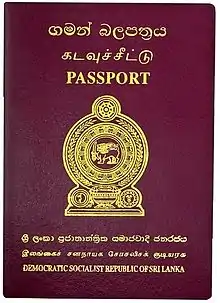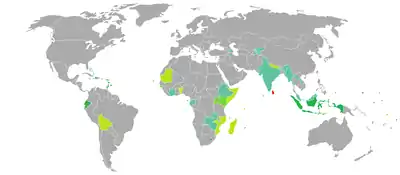Sri Lankan passport
Sri Lankan passports are issued to citizens of Sri Lanka for the purpose of international travel. The Department of Immigration and Emigration is responsible for issuing Sri Lankan passports.
| Sri Lankan passport | |
|---|---|
 The front cover of a non-biometric Sri Lankan passport. | |
| Type | Passport |
| Issued by | |
| First issued | 10 August 2015 (biometric passport) |
| Purpose | Identification |
| Eligibility | Sri Lankan citizenship |
| Expiration | 10 years for adults and 3 years / 10 years for minors (below 16 years of age). |
Immigration and Emigration Department has begun to issue biometric passports according to international standards with effect from 10 August 2015[1]
Types
- Diplomatic Passport (Light Red ) - Issued to Sri Lankan diplomats, top ranking government officials and diplomatic couriers.
- Official Passport (Red ) - Issued to individuals representing the Sri Lankan government on official/state business
- Ordinary Passport (Brown ) - Issued for ordinary travel, such as vacations and business trips
- Valid for all countries
- Valid for specified countries (Discontinued from 31 December 2018)
- Emergency Certificate (Silver )
- Valid for India and Nepal (for Pilgrimage and medical treatment) (Discontinued from 31 December 2018)
- Non Machine Readable Passports (Brown ) - Issued by Sri Lanka Missions under special circumstances
All newly issued passports for adults will have a maximum validity of ten years from the date of issue under the Immigrants and Emigrants Act, regardless of when the previous passport (if any) was issued.
Cost and Validity
| Type | Valid countries | Fee | Validity | ||
|---|---|---|---|---|---|
| Normal Basis (10 working days) |
Urgent Basis (same day) | ||||
| Ordinary Passport | For adults | All countries | රු.3,500 | රු.15,000 | 10 years |
| For Minors (below 16 years of age) | රු.2,500 | රු.7,500 | 3 years | ||
| රු.3,500 | රු.15,000 | 10 years | |||
| Official Passport | රු.3,500 | රු.15,000 | 10 years | ||
| Diplomatic Passport | |||||
| Emergency Certificate | N/A | රු.3,000 | 2 years (can be extended for further two years) | ||
| India & Nepal | රු.500 | N/A | |||
| Non Machine Readable Passport & Temporary Travel Document | N/A | N/A | රු.2,500 | valid only for one way travel to Sri Lanka | |
| Identity Certificate | N/A | N/A | රු.3,000 | Note : issued to a foreigner whose passport or travel document has been lost, stolen or expired whilst in Sri Lanka | |
In case of a lost passport, a fine of රු.10,000 charge in addition to the passport fee.
Identity information page
The Sri Lankan passport includes the following data:
- Photograph of the holder (digital image printed on page)
- Type ('PA' or 'PB' for Ordinary Passport, 'PC' for Official Passport and 'PD' for Diplomatic Passport)
- Country code ('LKA' for Sri Lanka)
- Passport No. (Starting with 'N' for Ordinary Passport, 'OL' for Official Passport and 'D' for Diplomatic Passport)
- Surname
- Other Names
- National Status ('SRI LANKAN')
- Date of Birth (DD/MM/YYYY)
- Sex 'M' for Male and 'F' for Female
- Place of Birth (only the city or town is listed)
- Date of Issue (DD/MM/YYYY)
- Date of Expiry (DD/MM/YYYY)
- Profession
- ID No. (National Identity Card Number)
- Holder's Sign (digital signature printed on page)
- Authority Colombo (digital signature of Controller General of Immigration and Emigration)
The information page ends with the Machine Readable Zone.
Biometric Passport
From the 10 August 2015, all newly issued passports are to be enabled with Biometric interfaces to allow holders to be applicable for 'Visa Waiver Programmes' (VWP) available in certain countries. The passport is valid like the Machine Readable PP for 10 yrs. from issuance. The Sri Lankan passport is ranked very poorly in global visa free access lists.
The Sri Lankan government has not issued the e-passport because of procurement inefficiencies.[2]
Citizens interested to receive this or renew their existing passport are to be photographed by authorized photo studios around the island and be present for "fingerprint scanning' at the office in Colombo and other major cities. A list of authorized studios are available here.
IMPORTANT INFORMATION: (as at 10/08/2015)
- All passport applicants irrespective of age should use passport Application Form K 35A
- All passport applicants including children should provide digital photograph through Authorized photo studio
- Fingerprints will be collected from all applicants above 16 years at the head office and three regional offices in Sri Lanka
- Applicants submitting passport applications through Sri Lanka Diplomatic Missions overseas could do so without providing fingerprints and digital photograph. Holders of such passports could provide fingerprints on their first arrival in Sri Lanka at the head office or any of the regional offices of the Department.
- Inclusion of children in parents passport will NO longer be allowed and children will be issued separate passports
- Children below 16 years of age whose passports are issued after 10 August 2015 are required to provide fingerprints to the Department upon reaching the age of 16 years. Holders of such passports living abroad should do so upon first arrival in Sri Lanka.
- No Emergency Certificate (EC) shall be issued for applicants below 60 years
Sri Lankan Passport for a Dual Citizen
Sri Lanka allows dual citizenship. However, under the 19th amendment of that country's constitution. An individual who holds citizenship in both Sri Lanka and another country can obtain a Sri Lankan passport.
An individual who holds citizenship in both Sri Lanka and another country can obtain a Sri Lankan passport by submitting the following documents.
(Download printable versions of the Application Forms here)
- Completed Application Form
- Photo studio acknowledgement
- Dual Citizenship Certificate with a photocopy. (A copy of payment receipt for citizenship Registration may be accepted)
- Foreign passport with any Sri Lankan passport if there is (with photocopy of Bio data pages)
- National Identity Card with a photocopy.
- Birth Certificate with a photocopy.
For further information: click here to be redirected to the department's website
Note of passport
The passport contains the following note :
මෙය දරන්නාට අවහිර බාධාවලින් තොරව නිදහසේ ගමන් කිරීමට සහ අවශ්යවන ආධාර ද ආරක්ෂාව ද සලස්වා දෙන ලෙසත් අදාල වගකීම් දරන සියලු දෙනාගෙන්ම ශ්රී ලංකා ප්රජාතාන්ත්රික සමාජවාදී ජනරජයේ ජනාධිපති ඉල්ලුම්කර ද අපේක්ෂාකර ද සිටී.
இதனை வைத்திருப்பவர் தங்குதடையின்றி இலகுவாகப் பிரயாணஞ் செய்ய அனுமதிக்குமாறும் வேண்டிய உதவியையும், பாதுகாப்பையும் அளிக்குமாறும் இது தொடர்புடைய சகலரையும் இலங்கைச் ஜனநாயக சோசலிசக் குடியரசின் ஜனாதிபதி அவர்கள் வேண்டிக் கொள்கிறார்கள்.
The President of the Democratic Socialist Republic of Sri Lanka requests and requires all those whom it may concern to allow the bearer to pass freely without let or hindrance and to afford the bearer such assistance and protection as may be necessary.
Visa requirements

As of 30 May 2019, Sri Lankan citizens had visa-free or visa on arrival access to 43 countries and territories, ranking the Sri Lankan passport 95th in the world in terms of travel freedom (tied with the DR Congo and Kosovan passports) according to the Henley Passport Index.[3] Additionally, Arton Capital's Passport Index currently ranks the Sri Lankan passport 87th in the world in terms of travel freedom, with a visa-free score of 46 (tied with the DR Congo, Nigerian and North Korean passports), as of 7 February 2019.[4]
For an upper middle income country such as Sri Lanka, these rankings are considered to be extremely low. No concerted effort has been made to improve the ranking by the Sri Lankan state. One major implication of the poor ranking has been a brain drain.[5] Successive Sri Lankan governments have disengaged Sri Lanka from its neighbours in South and Southeast Asia by requiring its citizens to obtain visas prior to travel. Sights of long lines outside Foreign High Commissions and Embassies in Colombo is very common. Likewise, access to major markets such as Hong Kong, Bangladesh, Taiwan, Vietnam and China is also hampered by tedious and complex visa application processes.[6] This has resulted in relatively poor trade and economic integration with ASEAN and SAARC member countries. Likewise the Sri Lankan state spends millions on maintaining an extensive diplomatic service, which is said to bring little or no benefits to its citizens.[7] Many expatriate Sri Lankans have given up their citizenship due to this. This has led to a significant skills shortage.[8]
References
- "Sri Lankan Govt. begins to issue biometric passports". 10 August 2015.
- "Sri Lanka says shortage of passports to end soon - Xinhua | English.news.cn". www.xinhuanet.com. Retrieved 2020-01-04.
- "Henley Passport Index 2008 to 2019". Henley Passport Index.
- "Global Passport Power Rank | Passport Index 2019". Passport Index - All the world's passports in one place.
- "Educated youth leaving the shores of Sri Lanka: Is it brain drain or brain gain?". www.ft.lk. Retrieved 2019-06-01.
- "Financial Times". www.sundaytimes.lk. Retrieved 2019-05-30.
- "Sri Lanka : President increases percentage of Foreign Service personnel to head overseas missions to 55". www.colombopage.com. Retrieved 2019-06-07.
- "Sri Lanka plans evidence-based skills visa to fill shortages: Harsha". www.economynext.com. Retrieved 2019-07-20.